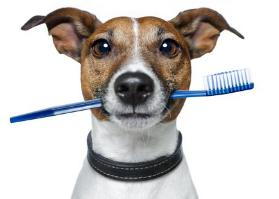
- posted: Oct. 05, 2018
Could you imagine going days, even weeks without brushing your teeth? I’m sure your answer to that is no. So why let our pets?
Dental disease exists in an estimated 85% of animals over 3 years of age, most of the time without us even knowing it. Dental disease can range anywhere from gingivitis and bad breath to dirty calculus filled teeth to painful, loose mobile teeth that are just asking to be pulled. Early stages of dental disease can be reversed by brushing daily, a good dental diet, water additives and even cleansing gels.
If the mouth gets to the point that we need to do dental work, prevention is key afterwards as plaque starts to form on the teeth as soon as 24 hours after the cleaning.
Dental cleanings are the exact same as when we get our teeth cleaned with our dentists, the only difference is that in order for it to be done properly your pet has to be anesthetized. They are hooked up to IV fluids which allows us to keep them hydrated, helps regulate their blood pressure during the procedure and also gives us direct access to their vein. They are then given a needle to sedate them. This needle usually consists of not only a sedative but also a pain medication. They are then given a second needle through the IV port which allows them to sleep for a few minutes without needing gas anesthetic. We then place a soft tube into the trachea to help to support their breathing and also allows us to deliver the oxygen and gas anesthetic into their body. They are hooked up to monitors where their heart, respiration, blood pressure, temperature, and even the percentage of oxygen in the blood is measured.
If the teeth are quite bad and we know or even suspect a tooth, or teeth, needs to be extracted we will take digital dental radiographs of the mouth. They are displayed onto a laptop that is in the dental suite. This makes it very quick for the Doctor and Technicians to look at and diagnose issues with the teeth or surrounding periodontium. Sometimes a tooth can look great on the surface but underneath the gum line, there may be bone loss, root decay, or even infection.
The same can be reversed; if the tooth is full of calculus and looks like it needs to be extracted it may look great on the x-ray and we just do a nice deep clean on it. Once the x-rays are done we chart the mouth. This means that we measure underneath the gum line to make sure there aren’t any major pockets or gum recession. We also look for any mobile teeth, discoloration, cavities, etc. In addition to this we inspect the whole mouth, lips, tongue etc.
A full cleaning of the teeth and under the gum line is then performed. First, we take off any thick calculus with a cracker. We then hand scale about 80% of the tartar off of the teeth which allows us to get underneath the gum line and in those little nooks and crannies. Once that’s done we finish the scaling, or cleaning, with the electric scaler. This ensures that everything is off of the teeth. Once the cleaning is completed the veterinarian would come remove any teeth that have been diagnosed as having to come out.
Once the extractions are completed, we polish the teeth. Polishing smooths the microscopic scratches in the enamel that may attract bacteria. Then we apply a fluoride treatment which helps prevent tooth decay by making the tooth more resistant to acid from plaque bacteria and sugars that live in the mouth. We rinse that fluoride very well after letting it sit for 60 seconds.
Once all of this is completed we wake your pet up, ensuring that their pressures, temperature, gum color, heart and lungs are well.
February is National Pet Dental Health Month. It’s a great time to learn more about your pet’s dental health. Here at Lakeshore Road Animal Hospital we are doing FREE dental exams with our Veterinary Technicians. They will explore your pets mouth and let you know how things look “under the hood”. We also have dental swag bags and free food! Call us to book your pets exam today.
Lakeshore Road Animal Hospital
2319 Lakeshore Road W, Oakville
289-837-0100
Office Hours
8:00 AM - 8:00 PM
9:00 AM - 2:00 PM
Closed
Location
2319 Lakeshore Rd W.
Oakville, ON L6L 1H2, Canada


